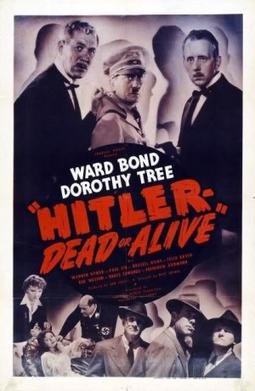The 1942 film, Hitler — Dead or Alive, opens with two reporters visiting a prominent industrialist named Samuel Thornton (Russell Hicks). They are curious about a statue of three men that stands outside of Thornton’s mansion. Thornton proceeds to tell them the story of the three men.
In 1939, shortly after the Nazis invaded Poland and with the United States still pursuing a policy of neutrality, Thornton independently offered a million dollars to anyone who could bring Adolf Hitler to justice, dead or alive. Accepting the offer were three ex-cons who had just been released from Alcatraz, Steve Maschick (Ward Bond), Hans “The Dutch” Havermann (Warren Hymer), and Joe “The Book” Conway (Paul Fix). (As you may have guessed “The Book” is the intellectual of the group and yes, he wears glasses.) After Thornton makes clear to them that they’re going to have to make sure that they either capture or kill the real Hitler and not one of his many doubles, the three men join the Royal Canadian Air Force and, along with ace pilot Johnny Stevens (Bruce Edwards), they head for Germany.
Made for an obviously low-budget, this B-movie is a bit of a curiosity. It starts out as a comedy, with the three cooks cracking jokes about going straight and a lengthy sequence in which they try to work up the courage to parachute into Germany. Even after they get caught by the Gestapo and sent to a prison camp, much of the film is played for laughs. It’s not until they escape from the prison and Johnny sacrifices his life while shooting it out with the Nazis that the film starts to take a more serious turn. Steve, who starts out the film only caring about the money, comes to realize that there are more important things than just finding a quick payday.
Steve, Hans, and Joe end up at the mansion of Else von Brandt (Dorothy Tree), a secret member of the German resistance who is so trusted by the Nazis that Hitler himself (played by Bobby Watson) will be stopping by for a visit. By this point, Steve explains that he no longer cares about the money. As far as he’s concerned, he’s now working for free. After learning about all of the people who have been killed by Hitler, Steve is determined to stop him, even if it means sacrificing his own life.
There are still moments of humor to the found in the latter half of the film. When Steve, Hans, and Joe confront Hitler, one of the first things that they do is shave off his mustache. But the film’s conclusion is ultimately a very serious one and features one particular act of violence that I imagine stunned audiences in 1942. Having told the story of the three men and their mission to get Hitler, Samuel Thornton ends the film by saying that it doesn’t matter whether Germany is being led by Hitler or Hitler’s double. What matters is eradicating all of the Nazis from the Earth. In the end, the message of the film is a simple one. It’s okay to laugh. It’s okay to joke. But, in the end, everyone must do their part.
Hitler — Dead or Alive was made for an obviously low-budget and there are a few scenes, especially in the beginning, where the pace feels a bit off. Just as with Beast of Berlin, the film’s version of a German prison camp feels like it could have been lifted from a dozen American crime films. But Ward Bond is a strong hero and he delivers his lines with conviction, especially when he discusses why nothing is more important than stopping Hitler. He gets good support from both Paul Fix and Warren Hymer. The film may start out as a comedy but it’s anti-Hitler message comes through loud and clear. Seriously, how can you not appreciate a film about defeating the Nazis?

